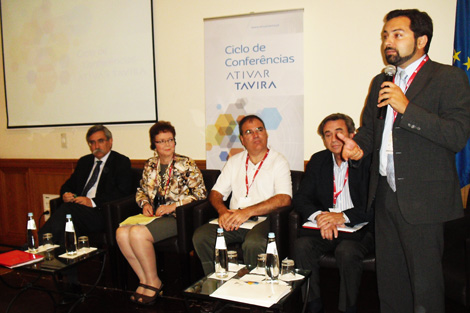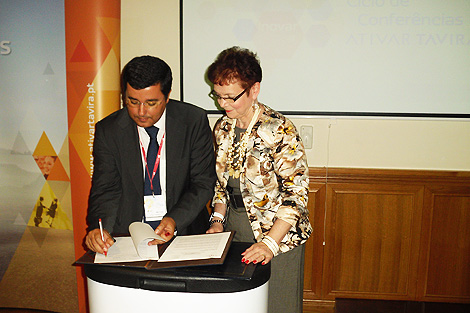 Joining the efforts of universities and companies with those of the public administration to create an economic development strategy is now seen by many as fundamental. A trinomial that was very evident in the first session of the conference cycle “Ativar Tavira”, which was launched last Friday and intends to reflect on the future economic development of this municipality.
Joining the efforts of universities and companies with those of the public administration to create an economic development strategy is now seen by many as fundamental. A trinomial that was very evident in the first session of the conference cycle “Ativar Tavira”, which was launched last Friday and intends to reflect on the future economic development of this municipality.
The themes chosen for this first session were technology transfer from universities to companies and innovation in companies.
Two themes that framed the signing of a Memorandum of Understanding between the Chamber of Tavira and the New Jersey Institute of Technology (NJIT), within the scope of the creation of a technology-based business incubator in the Parque Empresarial de Tavira.
In practice, this means that the Tavirense initiative to promote new business now has two partners from the academic sector. The University of Algarve is also associated with the initiative and the scientific coordinator of the project «Activate Tavira» Carlos Vieira is the natural bridge with the Algarve university, where he teaches.
On the universities' side, the need to play an increasingly active role in promoting the economic dynamism of the regions they serve is something that is seen as fundamental on both sides of the Atlantic. But always with the participation of economic agents and with a proactive attitude on the part of public authorities.
The rector of the University of Algarve João Guerreiro was one of the guest speakers and made it clear that the time of the «massification of higher education», which marked the first decades of the institution's existence, has passed and that today the entity he directs has as its main role «the production and dissemination of knowledge, as well as the qualification of society».
 In other words, today there are already graduated seniors and it is becoming increasingly necessary to create innovative companies that take advantage of the knowledge produced in universities and the existence of these professionals.
In other words, today there are already graduated seniors and it is becoming increasingly necessary to create innovative companies that take advantage of the knowledge produced in universities and the existence of these professionals.
A paradigm shift that includes public authorities. João Guerreiro recalled that the next Community Support Framework in the Algarve will be “radically different from the previous ones”, with funds destined for infrastructure becoming marginal.
The focus will shift to economic development, through the dynamization of companies and incentives for innovation. «Tavira, with this step, is preparing for that», considered the dean of UAlg.
Similar ideas across the Atlantic Ocean
In the United States of America there is no QREN, but the vision of the role of universities in this field is very similar. NJIT Vice Dean Judith Sheft came to Tavira to talk, essentially, about the business incubator for which she is responsible, within NJIT, but took the opportunity to talk about the role of universities in the current economic context.
Judith Sheft also sees the triad of academia/business/public administration as fundamental to boosting economic development. "We want entrepreneurs to bring us their problems," he said. At the same time, there must be public policies that encourage the establishment and birth of companies.
Even from universities, the contribution can go far beyond knowledge, at least with regard to companies that are starting up, considered Judith Sheft.
“New companies always face major challenges, namely in terms of access to raw materials, knowledge, financial and human resources. Incubator universities can be of great help in this field, reducing risks», he considered.
In the case of the existing incubator at NJIT, entrepreneurs have access not only to spaces to settle in, but also to a series of specialized services, such as laboratories and various machinery. In this way, they avoid large investments at an early stage of the business.
Also in terms of human resources, there are advantages to being incubated within NJIT. According to Judith Sheft, within the university there are programs that encourage companies and students to collaborate, with advantages for both.
In other words, a company that needs, for example, an engineer, can count on the services of a student who has the necessary skills. The student will earn much less than a technician who has already graduated, but still receives a salary, gains experience and enriches the curriculum.
Judith Sheft took the opportunity to open the door to Portuguese businessmen who want to venture into the North American market. At NJIT there is a "soft landing" program, in a free translation "soft landing", in which foreign companies are welcomed and supported in the business incubator, so that they have a secure entry into the American market.


















Comments